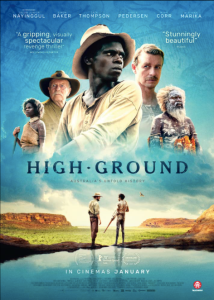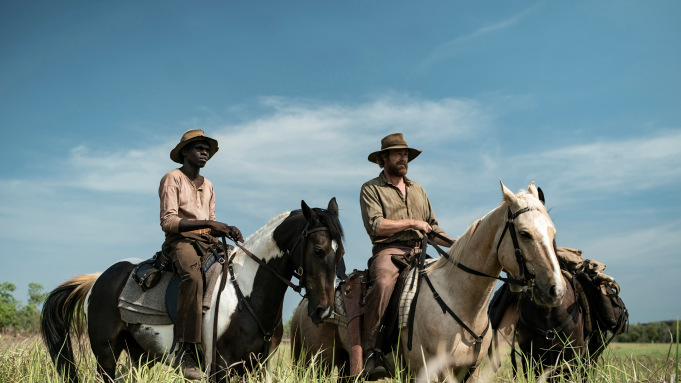Review – High Ground (2020)
Director: Stephen Johnson
Starring: Jacob Junior Nayinggul, Simon Baker, Callan Mulvey, Jack Thompson, Sean Mununggurr, Caren Pistorius, Ryan Corr, Witiyana Marika, Esmerelda Marimowa
The last decade and a half has witnessed a pronounced shift in Indigenous screen narratives, moving away from traditionally hard-hitting social-realist dramas towards the embracing of genre. One of the most interesting aspects of this shift has been the embracing of the Western. Through films like Warwick Thornton’s Sweet Country and Ivan Sen’s Mystery Road,this classical genre, traditionally the site of nation-building mythologising, has been co-opted to serve as a site of cultural reckoning, negotiating the unresolved traumas of Australia’s colonialist history. While High Ground director Stephen Johnson is not himself an indigenous man, he has had a long career working with Indigenous creatives, and his long awaited sophomore film, produced by former Yothu Yindi member Witiyana Marika and made in consultation with the local Indigenous clans, continues this genre subversion.
In 1919, in the remote Arnhem Land region of Australia’s Northern Territory, a botched police operation investigating a killed cow results in the massacre of an Aboriginal community. Travis (Simon Baker), a former military sniper now police officer, intervenes to save a young boy, Gutjuk, turning him over to the care of Father Braddock (Ryan Corr) and his sister Claire (Caren Pistorius) at the East Alligator River Mission. Twelve years later, Travis, who has since left the force, is recruited by Captain Moran (Jack Thompson) to track down the ‘Wild Mob’ who have been killing livestock, burning stations and have recently murdered a white woman, and are led by an Aboriginal warrior named Baywara (Sean Mununggur), believed to be a survivor of the massacred community. Travis recruits the now grown Gutjuk (Jacob Junior Nayinggul) to serve as a tracker. As the two pursue the mob led by his uncle, Gutjuk is forced to consider where his allegiances lie.
Where the classical American Western is rife with stories of combat between ‘cowboys and Indians,’ Australia’s traditional mythology of its own colonial past has tended to underplay the extent to which the nation was built on frontier wars. High Ground takes the standard Western narrative of the posse being put together to deal with a marauding tribe of ‘natives’ terrorising settler communities and shifts our perspective on it. The film’s prologue, in which we see the massacre of Baywara and Gutjuk’s community at the hands of white police officers challenges our generic assumptions of what the inciting aggression of such stories is. When, twelve years later, Captain Moran fears that a larger investigation into Baywara’s mob will result in details of the massacre becoming public, it is the killing of two white officers, rather than the murder of numerous Indigenous men, women and children, that he is concerned will come to light. Despite this disregard for Aboriginal life, Moran’s statement that “Civilisation is built by bad men doing bad things, clearing the way for everybody else,” flies in the face of the ‘they didn’t know what they were doing was wrong’ narrative often spun about colonial settlers. But history is written by the victors, something evident in Moran’s conscious attempts to shape that history through recurring scenes in which he stages photographs to record his efforts in the Northern Territory.
While starting the film embedded in the Aboriginal community, Johnson and writer Chris Anastassiades make the decision, arguably concession, to share screen time evenly between Gutjuk and Travis, rather than committing to a fully Indigenous perspective on events. Travis is established as a man of integrity, largely through his contrast to fellow officer Ambrose (Callan Mulvey), but the film stops short of entirely slipping into the white saviour trope. Burdened by the guilt of what happened at that waterhole, Travis is an outsider in his community and, in that regard becomes a parallel figure to Gutjuk, himself an outsider as an Aboriginal man raised and educated in a white mission. The uneasy bond that forms between the two is an interesting one, with Gutjuk seeing Travis as both a mentor of sorts, and a representative of the enemy.
Despite this determination to share screen time, the stylistic presentation of the film aligns us with an Indigenous perspective. Where Australian Westerns have tended to focus on the harsh, inhospitable nature of the outback, highlighting the incompatibility of this environment with European ways of life, Andrew Commis’ beautiful cinematography shows us a green and fruitful Arnhem Land teeming with life. This is a contested territory – “You can’t share a country” Ambrose tells Claire – but the environment itself is never framed as antagonistic. This visual treatment is supported by a score comprised solely of a capella Aboriginal chanting.
Early 2021 has seen Australian films really capitalising on the space created at the domestic box office by Hollywood continuing to hold back their heavy hitters, and High Ground continues to build on that momentum. Johnson’s film is a gritty revenge Western, at different times beautiful and brutal, that highlights the cyclical nature of violence while questioning not only the mythologies that lie at the heart of the Western genre, but those on which Australian nationhood is built.
Rating: ★★★☆



You must be logged in to post a comment.